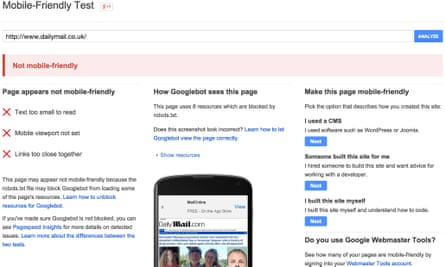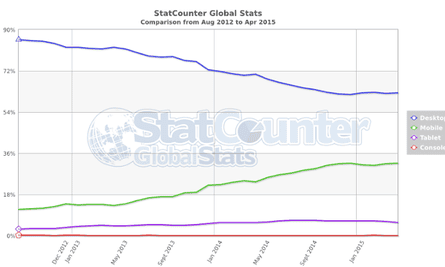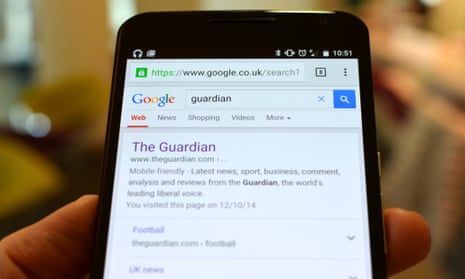Having a site that is friendly to mobile browsers on smartphones and tablets will be key from Tuesday as Google rolls out a new mobile-focused algorithm.
The update to the way Google ranks search results will take into account how mobile-friendly a website is. This means companies without a good mobile website will suffer, as searchers on mobile will see sites with good mobile experiences ranked higher than those with no mobile or poor mobile sites.
The change reinforces Google’s mobile-focus – it previously just labelled search results that had good mobile websites – and is expected to have an impact bigger than the previous two algorithm updates Panda and Penguin, which affected 12% and over 3% of search results respectively.
“We will be expanding our use of mobile-friendliness as a ranking signal. This change will affect mobile searches in all languages worldwide and will have a significant impact in our search results,” said Takaki Makino, Chaesang Jung and Doantam Phan in a blog post for Google webmasters.
Mobile-friendly is the new hotness
The change is designed to help users find search results formatted for their device, Google said. The company often makes tweaks to its algorithms and technology powering search, but announces few. That this has been announced suggests Google expects the change to cause a big impact, potentially affecting traffic and revenue for a number of sites that heavily rely on search results.
Mail Online, the world’s largest English-language news site, for instance has never introduced a mobile-friendly front page and as a consequence will likely suffer.

Google announced the change to website operators in February, rolling out a mobile-friendly test and several other tools to help sites and services conform to the new mobile ranking.
In the UK, adults will spend more time on mobile devices than desktop computers in 2015, according to research from eMarketer, spending 2 hours 26 minutes a day on mobile devices excluding voice calling time compared to 2 hours 13 minutes on a desktop.
Google also estimates that around 50% of searches are conducted from mobile devices, through mobile browsers and its own search apps.

But PCs still claim the largest share of internet browsing, with 62.4% of global browsing compared to 31.7% on mobile and 5.8% on tablets in April, according to data from research firm StatCounter. Desktop global internet browsing has steadily declined, however, from 85.6% in August 2012 through 70.5% in April 2014, as mobile use has increased and tablet and console browsing has stayed steady.
The majority of large companies offer mobile experiences, with more and more moving to so-called “responsive” design, where by a site scales dynamically based on the size of the browser window or device’s screen, providing the best experience possible to a large range of screen sizes.
Google has not given figures on the percentage of web searches that are likely to be affected, but the fallout from the update for sites and services is expected to force more companies to adopt mobile sites and responsive design – Google’s current preferred implementation of the mobile web.
Google hides URLs in mobile web search results
European commission announces antitrust charges against Google

Comments (…)
Sign in or create your Guardian account to join the discussion